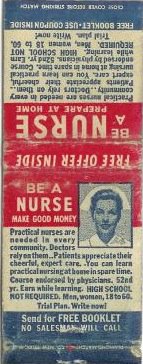Is Your Spleen Squeaky Clean?
 Okay. I thought by now I had seen it all, but this.....this is really bad.
Okay. I thought by now I had seen it all, but this.....this is really bad.
Be a nurse and make good money....why gosh it never occurred to me to be a nurse until I picked up these matches!
Granted, this is for "practical nursing", as opposed to what? Impractical nursing? Maybe they mean LPN. It's still insulting. And the nurse is wearing the coveted cap.
Learn from home in your spare time? What is this, an old Sally Struthers TV commercial? Who are your clinical patients supposed to be? Family? Neighbors? Your animals? Where do you get your equipment? How do you know if you're doing things right or not?
The course is endorsed by physicians. Well then, it must be A-OK! Not! But I betcha they don't hire the "graduates".
But wait! High school is not required! Whew! I bet that was a load off some folk's minds. 'Specially since you can be anywhere from 18 to 60!
Send for the free booklet! No salesman will call! Nobody will oversee your education! What more could you want?
One minute you have nurses beseeching you to join their ranks for the good of the country and the next thing you know they're soliciting from matchbooks.
I just hope they close their cover before striking......
Young girl, early teens, unrestrained front seat passenger of a car driven approximately 25 mph head first into a wall. Old car, long ago, no airbags to deploy.
Patient is ambulatory on scene without c/o neck, back or head pain. Slight pain to lower left ribs but nothing more. Mother arrives on scene and signs patient out AMA, stating she will transport patient to the ER. And she does.
My ER. My non-trauma center ER. As triage nurse for the day, I began taking the history. Slight pain on palpation when left lower ribs are softly touched. Pain increasing slightly with inspiration. Lungs clear. Denies SOB. I'm thinking pulmonary contusion, maybe rib fracture. The mechanism of injury was not great, but the patient was walking and looking good on scene and when he got to the triage station. Then, suddenly the patient begins to look rather, uh, sick. Icky. Pale. Nauseated. Shocky. Bad.
This is not good.
Mom gets sent out to registration and patient comes with me, in a wheelchair for obvious reasons but now she can't stand up straight anyway. I grab the ER doc on the way in. He examines the patient only to discover within about one-half second that it is not the ribs, it's left upper abdominal pain and we are goin' to the OR. Mom returns within minutes and gets the scoop. Two large bore IVs with a bolus (BP falling)while the OR gets ready and off we go.
Ruptured spleen.
I hate it when they do that.
Everyone was very sick in some fashion or another, almost all requiring IVs and medications for pain or nausea (or both). Lots of respiratory distress and a couple of in-house codes to top it all off. (We lose the ER doc and an ER nurse for what is hopefully a short period of time when someone in the hospital has a cardiac arrest).
We had people sitting in the waiting room that I desperately wanted in rooms; they were miserable.
Finally we get one bed open. I'm about to call in the next patient. This guy walks up being supported by friends. "Hey, like, he has the flu, man. Been vomiting all night. He even passed out twice at home!" Sounds like he's dehydrated from gastroenteritis just like the rest of the county. But passing out twice kind of gives you priority for a bed. We don't take kindly to syncope (fainting).
I asked the patient to gown and lay down on the bed. He said it hurt to lay down. Well geeze, dude, if you don't lay down and you're dehydrated you're gonna pass out again! I said it a wee bit more professionally than that. Nope, he wasn't gonna lay down. Okay.
"Look," I told the friends. "Sit next to him on the side of the bed. If he feels dizzy lay him down."
He needed an IV, like yesterday. But..... three more patients walked in and I ran out to have them sign in for triage and make sure none of them was having a heart attack, stroke, etc. And someone had to take report from the medics who had brought in a possible stroke victim.
Did I mention that at this particular facility there were only 2 nurses after 2300? It was after 2300.
I heard loud cries for help from the friends of our vomiting, fainting guy. I rush in to find him, essentially unconscious, sitting between them. They hadn't laid him down. So I did. He woke up.
Blood pressure of 70 systolic when flat. And in pain.
I still thought he was a severe case of dehydration but a little voice inside my head made me act like a trauma nurse and put in two large bore IVs. One of them was a 14 Gauge. A freakin' hose. Had the ER doc at the bedside by that time and he did his exam. The patient's abdomen was rock-hard. It was so tender that even touching the hairs on his upper abdomen was excruciating.
No fever. Sudden onset. Denied trauma. Normal BMs. Weird.
The IVs kept flowing so that I could get his blood pressure up and try to address the pain issue. And the pain kept getting worse and the blood pressure would not respond. It seemed like it took forever to get my patient to the CT.
Ruptured spleen.
Massive hemoperitoneum.
Say what?
We didn't believe it. We had one "ruptured spleen" in surgery already. We thought they had faxed us the earlier report.
Then the truth came out. Three weeks earlier, a large tool had fallen onto the patients left side. It was sore, nothing major. He did notice he could no longer jog without pain, which he thought was weird, but nothing to see a doctor about. He had a hematoma on his spleen. It started bleeding that night, giving him the "flu" symptoms he presented with.
He made it. So did the first patient. I, however needed a weeks worth of Ativan after that shift.
So don't be surprised if you are ever in an ER for a sprained ankle and the nurse asks how your spleen is feeling.
It will be me.
I hate spleens.











11 Comments:
Geeze Kim ... that gives a whole new meaning to being "spleeny!" *cringe*
.
Geez, what're the odds of two of those things in one night in a non-triage ER?! lol I'll send you my prescription for Ativan. I've never used it. I was given the prescription when I went into the ER for a migraine and was labeled "hysterical" and "stressed out". lol
man, that's why i don'twant to work in the ER...it's too exciting! and i'm too old for that kind of excitement:)
Stay away from the Ativan. ;o)
Kim, I LOVE your blog - you tell the tale so well that it seems like I am right beside you, and you think so many things that I think. Thanks for being such an awesome voice for nurses in general and emerg nurses specifically.
Wow! That's one hella shift! What are the odds?
I'll start off by saying that I am not a nurse. I'm wondering what a "large bore" iv is? Is it exactly what it sounds like, a really nasty huge needle in your poor tiny arm? It kind of gives me the heebie jeebies. There was a time when I wanted so badly to be a nurse but I guess the fact that I shudder when thinking about receiving an iv might be a good sign that I'm not quite cut out for it, eh?
h.k.: A lot of people don't realise that the needle doesn't actually stay in your arm! It's surrounded by a sheath of plastic, which remains in the vein after you take the needle out. Yes, the needle used to put it in will need to be fairly big also ;)
Really large bore cannulae are handy in adults because you can squeeze an awful lot of fluid through them in a short space of time, maintaining blood pressure. Basically Kim's patient was bleeding out of his spleen and into his abdomen just as fast as they could fill him up with fluids.
You know, now that I'm remembering, when I was giving birth I had to have an iv but the nurse used some kind of anesthetic (sp?) first and it actually was not that bad, except that it felt like the needle was being threaded all the way up to my shoulder or something. It was a very odd sensation. But I was still a little freaked out by it. I guess there is just something about having tubing under your skin that is pretty uncomfortable, mentally. I don't mind watching things being done to others and the thought of giving someone else an iv doesn't creep me out quite as much. I just hate getting them. Any RNs who feel this way, or does it go away after you've been giving them for a while?
when i worked Trauma, i disliked spleens too, just because they could go bad quickly and you wouldn't pick up on that if you were relying on q6h CBCs (as some of the residents seem to do, silly rabbits!)... plus, spleen lacs = bedrest and NPO... people who are alert and oriented don't like to be told they can't get up or eat anything for a few days...
h.k.: i'd much rather be putting an IV in someone than getting one myself... the few i've had always felt quite uncomfortable (not getting it put in, but the sensation of having it in there, period)... i couldn't imagine leaving them in for a few days... putting them in someone else isn't bad, because you know you're doing it for a reason...
ICK. I think hospitals are exciting, but that night would do me in for good!
Post a Comment
<< Home